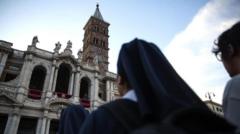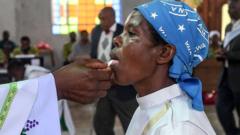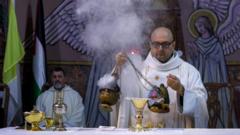Amid unprecedented times, the College of Cardinals is set to convene in the Sistine Chapel, tasked with electing a successor to Pope Francis. With 80% of cardinals appointed by Francis himself, this conclave is unique, offering a diverse representation and diminishing the historically European dominance in the papacy. The dynamics of this election are further complicated by varying perspectives within the College, making it difficult to forecast the outcome.
**Who Will Succeed Pope Francis? A Look at Possible Candidates for the Papacy**

**Who Will Succeed Pope Francis? A Look at Possible Candidates for the Papacy**
As the Catholic Church prepares for a pivotal conclave, the selection of the next pope is shrouded in unpredictability and global implications.
Prominent candidates include:
**Pietro Parolin:** The Italian Cardinal serves as the Vatican Secretary of State and is characterized by his diplomatic approach. Despite prior criticisms regarding issues like same-sex marriage, he may appeal for a global outlook, albeit with internal reservations about liberalism.
**Luis Antonio Gokim Tagle:** Championing social issues and drawing attention from the Philippines—a hub for Catholicism—Tagle is seen as a moderate figure. Although he espouses traditional Catholic views, his empathetic approach distinguishes him as a notable candidate.
**Fridolin Ambongo Besungu:** Hailing from the Democratic Republic of Congo, Ambongo leads with a conservative viewpoint aligned with local traditions. His experience amidst societal struggles positions him as a potential advocate for African voices within the Church.
**Peter Kodwo Appiah Turkson:** The Ghanaian cardinal stands as a contender from Africa as well, recognized for his principled stance on doctrine and social issues. Current dynamics, however, may place significance on his nuanced views regarding homosexuality.
**Peter Erdo:** Representing Hungary, Erdo's extensive leadership experience within Europe could provide a balancing factor amid discussions on Catholic relations. His conservative stance has garnered varied support across the spectrum.
**Angelo Scola:** The former Archbishop of Milan and a previous frontrunner has resurfaced in discussions because of his prominence within the Church’s intellectual circles, despite concerns about his age and contemporary relevance.
**Marc Ouellet:** This veteran candidate is noted for his influential role in shaping episcopal candidacies. However, his age may hinder his ability to actively participate in the upcoming conclave.
**Robert Prevost:** Emerging as a candidate from the U.S., Prevost has been recognized for his reformist leanings and previous experience in Latin America, though his history could lead to mixed perceptions among cardinals.
**Robert Sarah:** Known for his allegiance to traditional doctrine, he may represent a conservative choice as he navigates the complexities of modern Catholicism.
**Michael Czerny:** An advocate for social justice, Czerny’s Jesuit background ties him closely to Francis’s reformist ideals, though the conclave may avoid naming a second Jesuit pope.
The decisions made during the upcoming conclave will resonate deeply across the Catholic Church and its followers worldwide. The choice of the next pope not only symbolizes the Church's internal dynamics but also reflects its evolving relationship with the contemporary world.
As such, speculation on the ultimate successor is rife and the implications of their leadership will shape the Catholic Church for years to come.
**Pietro Parolin:** The Italian Cardinal serves as the Vatican Secretary of State and is characterized by his diplomatic approach. Despite prior criticisms regarding issues like same-sex marriage, he may appeal for a global outlook, albeit with internal reservations about liberalism.
**Luis Antonio Gokim Tagle:** Championing social issues and drawing attention from the Philippines—a hub for Catholicism—Tagle is seen as a moderate figure. Although he espouses traditional Catholic views, his empathetic approach distinguishes him as a notable candidate.
**Fridolin Ambongo Besungu:** Hailing from the Democratic Republic of Congo, Ambongo leads with a conservative viewpoint aligned with local traditions. His experience amidst societal struggles positions him as a potential advocate for African voices within the Church.
**Peter Kodwo Appiah Turkson:** The Ghanaian cardinal stands as a contender from Africa as well, recognized for his principled stance on doctrine and social issues. Current dynamics, however, may place significance on his nuanced views regarding homosexuality.
**Peter Erdo:** Representing Hungary, Erdo's extensive leadership experience within Europe could provide a balancing factor amid discussions on Catholic relations. His conservative stance has garnered varied support across the spectrum.
**Angelo Scola:** The former Archbishop of Milan and a previous frontrunner has resurfaced in discussions because of his prominence within the Church’s intellectual circles, despite concerns about his age and contemporary relevance.
**Marc Ouellet:** This veteran candidate is noted for his influential role in shaping episcopal candidacies. However, his age may hinder his ability to actively participate in the upcoming conclave.
**Robert Prevost:** Emerging as a candidate from the U.S., Prevost has been recognized for his reformist leanings and previous experience in Latin America, though his history could lead to mixed perceptions among cardinals.
**Robert Sarah:** Known for his allegiance to traditional doctrine, he may represent a conservative choice as he navigates the complexities of modern Catholicism.
**Michael Czerny:** An advocate for social justice, Czerny’s Jesuit background ties him closely to Francis’s reformist ideals, though the conclave may avoid naming a second Jesuit pope.
The decisions made during the upcoming conclave will resonate deeply across the Catholic Church and its followers worldwide. The choice of the next pope not only symbolizes the Church's internal dynamics but also reflects its evolving relationship with the contemporary world.
As such, speculation on the ultimate successor is rife and the implications of their leadership will shape the Catholic Church for years to come.





















